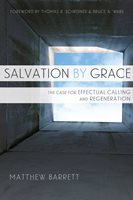Today we conclude our interview with Matthew Barrett, talking about his book, Salvation By Grace. If you missed part 1 of the interview you can catch up here.
 Books At a Glance (Fred Zaspel):
Books At a Glance (Fred Zaspel):
I understand that this book is the result of your doctoral thesis at Southern Seminary. How did you come to take up this subject? Is this area of study a matter of long-standing interest?
Barrett:
Two events/people stand out as instrumental. I remember walking through the halls of The Southern Baptist Theological Seminary while Tom Schreiner told me to choose this topic because he had students in his classes asking questions about it. I also remember going out to lunch with Bruce Ware, my doctoral supervisor, and discussing a couple of different possible topics to explore. Monergism rose to the top of the list because it became clear that there was yet to be written a book-length, contemporary treatment of the topic that also dealt with the many recent Arminian, Wesleyan, and modified views. Plus, it became evident to me that Warfield was right; monergism is the hinge on which Calvinism turns! And yet, little attention has been given to the ins-and-outs of effectual calling and regeneration.
Books At a Glance:
One question that comes to mind concerns the need for such a book. This, after all, is not a subject Calvinists have ignored! After many centuries of Reformed soteriology, what distinguishes your work? What is the contribution you are hoping to make here?
Barrett:
While monergism is an old doctrine, its relevance today is apparent as the late twentieth- and early twenty-first centuries have been characterized by a resurgence of Calvinism, and with it a resurgence of predestinarian theology which exalts God’s sovereignty rather than the will of man. As J. Ligon Duncan III explains, “A fever for the glory of God has gotten into the bloodstream of a new generation.” The resurgence of Calvinism has occurred in part because Christians are famished with the small view of God they have been fed and are hungry for the “big view of God” portrayed in the Scriptures and systematically articulated in the doctrines of grace. The doctrines of effectual calling and monergistic regeneration are but a slice of this biblical view of God, and yet they may be the very hinge of the Calvinist position. So, my book is a real effort to feed the hungry!
On a more academic note, though, my book not only presents a historical, biblical, and theological case for monergism but also a case against synergism. Few books I know of actually interact at great length with the various Arminianisms as well as the recent modified views that have been proposed in the last ten years. These diverse viewpoints are taught both in academic institutions and in local churches, yet there has not been a robust reply. My book seeks to show the exegetical and theological problems with such views, old and new, and persuade readers to return to the Reformed heritage first and foremost because when it is most faithful to Scripture.
A more thorough and extensive treatment of all of this can be found in the unabridged version here.
 Books At a Glance:
Books At a Glance:
How should an understanding of this doctrine as you expound it affect the Christian in terms of worship?
Barrett:
Great question! As we look back and realize that it was God, not us, who brought us from death to life, from darkness to light, the only proper response is worship (I make this point elsewhere in greater depth; see here and here). In other words, our automatic reaction should be: Soli Deo Gloria! We should be overflowing with humble cries like: Not to us, not to us, but to you, Lord, be the glory.
Sometimes it can be frustrating to see (sometimes even Calvinists) say things like: “Oh, yeah, the doctrines of grace…divine sovereignty…I believe it, but let’s not make such a big deal about it. Let’s move on to other things.” Really? It sure was a big deal to Jesus, Paul, Peter, and John, among others, even leading them to praise and worship God for what he had done (e.g., Rom. 9; Eph. 2). That said, monergism is not a box that we check off on our theological list, but a doctrine that should lead us into lifelong doxology. So it may be important to remind lay people and scholars alike that God’s sovereignty in salvation should ignite worship-filled passion within the soul.
Books At a Glance:
Have you been encouraged by the reception of your book?
Barrett:
I was honored to receive some great endorsements from theologians that I have looked up to for some time now. Their reception of the book was encouraging. Also, I continue to be surprised at the number of lay people, pastors, and doctoral students who tell me how much the book meant to them. Sometimes these words of encouragement come from Reformed pastors who have admitted that they have never thought through the issue before! So I pray that the book can continue to be used to help others in this way.
To God alone be the glory.
Editor’s Note: You can listen to Dr. Barrett talk about his book in this video below.

